Authors: Lóránt Győri (Political Capital) - Péter Krekó (Political Capital) - Blanka Zöldi (Lakmusz)
Since the annexation of Crimea in 2014 and the invasion of Ukraine in 2022, Russian hybrid warfare and disinformation efforts and the possibilities for European or Euro-Atlantic action against them wew in the focus of attention. At the same time, however, Beijing is engaged in much the same 'cognitive warfare' against Taiwan. The island, which lies some 200 kilometers off the coast of mainland China, is, in practice, an independent democracy, but the People's Republic of China regards it as a separatist state and is also using disinformation operations to destabilize it.
So much so that, according to a 2019 study, Taiwan is the country most targeted by foreign disinformation in the world.
In December 2022, we spent a week in Taiwan, and this article summarizes some of our experiences there. In particular:
In part, Russian and Chinese disinformation or "hybrid" warfare has eerily similar strategic objectives and associated means and narratives to achieve their territorial, geopolitical and military objectives.(Of course, many differences can be outlined - but this analysis is intended to draw attention to the similarities.
While Russia's major disinformation and cyber warfare against Ukraine shifted into higher gear in 2014 (when Russia annexed Crimea), the conflict between the People’s Republic of China and the Republic of China (Taiwan) goes back to the Chinese civil war in the mid-20th century. Chinese Communist Party (CCP), led by Mao Zedong, took over China in 1949 when the nationalist government led by Chiang Kai-shek fled to the island of Taiwan, and the CCP has been trying to “reunite” with Taiwan since then. These efforts, military threats, and information warfare have intensified since the 2016 Taiwanese presidential election, which was won by pro-independence candidate Tsai Ing-wen.
Similar to the Russian expansionist ideology, which justified its invasion of Ukraine by reclaiming territories and populations historically belonging to Russia, the Chinese state party and leadership consider Taiwan as part of its territory based on the "One China Principle". A significant difference, however, is that the Kremlin is using its disinformation capabilities in connection with its current military operations against Ukraine, while China is preparing for a future invasion and increasing the impact of its military exercises through the spread of fake news and other hybrid means. Another aim of disinformation attacks is to promote the idea of reunification to the Taiwanese society. Research suggests that this has been rather unsuccessful: less than 10 percent of Taiwan's population support immediate or future reunification with China - and, as we have seen in Ukraine, threats of belligerent aggression (unsurprisingly) do not make the idea more popular.
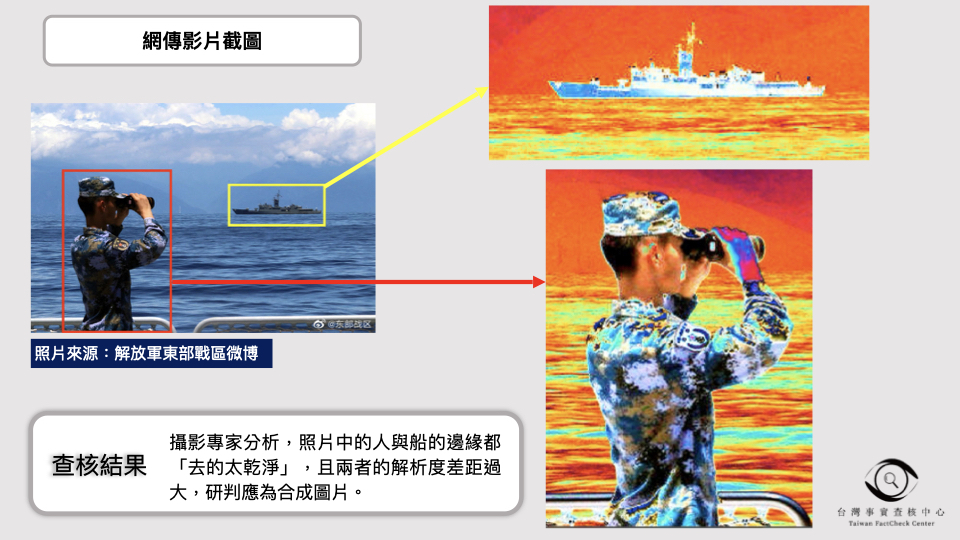
Shortly after US House of Representatives Speaker Nancy Pelosi's trip to Taiwan in August 2022, a number of threatening and misleading reports emerged about the military response planned by the Chinese Ministry of Defense. The above photo (allegedly of a Chinese crew closely observing Taiwan's coastline) was circulated by Chinese sources but was also picked up by Western media - only later to reveal that the photo had probably been manipulated. Source: Taiwan Factcheck Centre
China has developed and deployed a complex system of disinformation warfare, as noted by the Fu Hsing Kang College of Political Warfare at Taiwan National Defense University and the think-tank Doublethink Lab, which has researched Chinese disinformation efforts worldwide.
The Chinese information strategy aims primarily
Examples of attempts to polarize include incitement against the LGBTQ+ community, and blocking Taiwanese NGO-s from obtaining consultative status at the UN. Similarly, the Kremlin uses sexual minorities as a target, often pushing the disinformation narrative that adopting Western minority rights is weakening society and threatening traditional family and religious values. China also uses the most bizarre conspiracy theories to undermine trust between the government and society – some of which rhyme with some well-known conspiracy theories spread by the Kremlin.
For example, for years now, Taiwanese social media have periodically surfaced false allegations that organized crime groups in Cambodia invite Taiwanese youths on tourist trips and, once there, harvest and sell their organs. Fake pictures of "Cambodian tattoos" showing the scars left on the "victims" after the organs were removed have been circulating on social media. Although both Cambodian and Taiwanese authorities have denied these allegations, such rumors are a good reason for Taiwanese journalists and Chinese media in Hong Kong, who are paid off by Beijing, to accuse the Taiwanese government of inaction and for the Chinese government to play the role of the savior - while the Taiwanese authorities themselves have taken decisive steps to curb human trafficking.
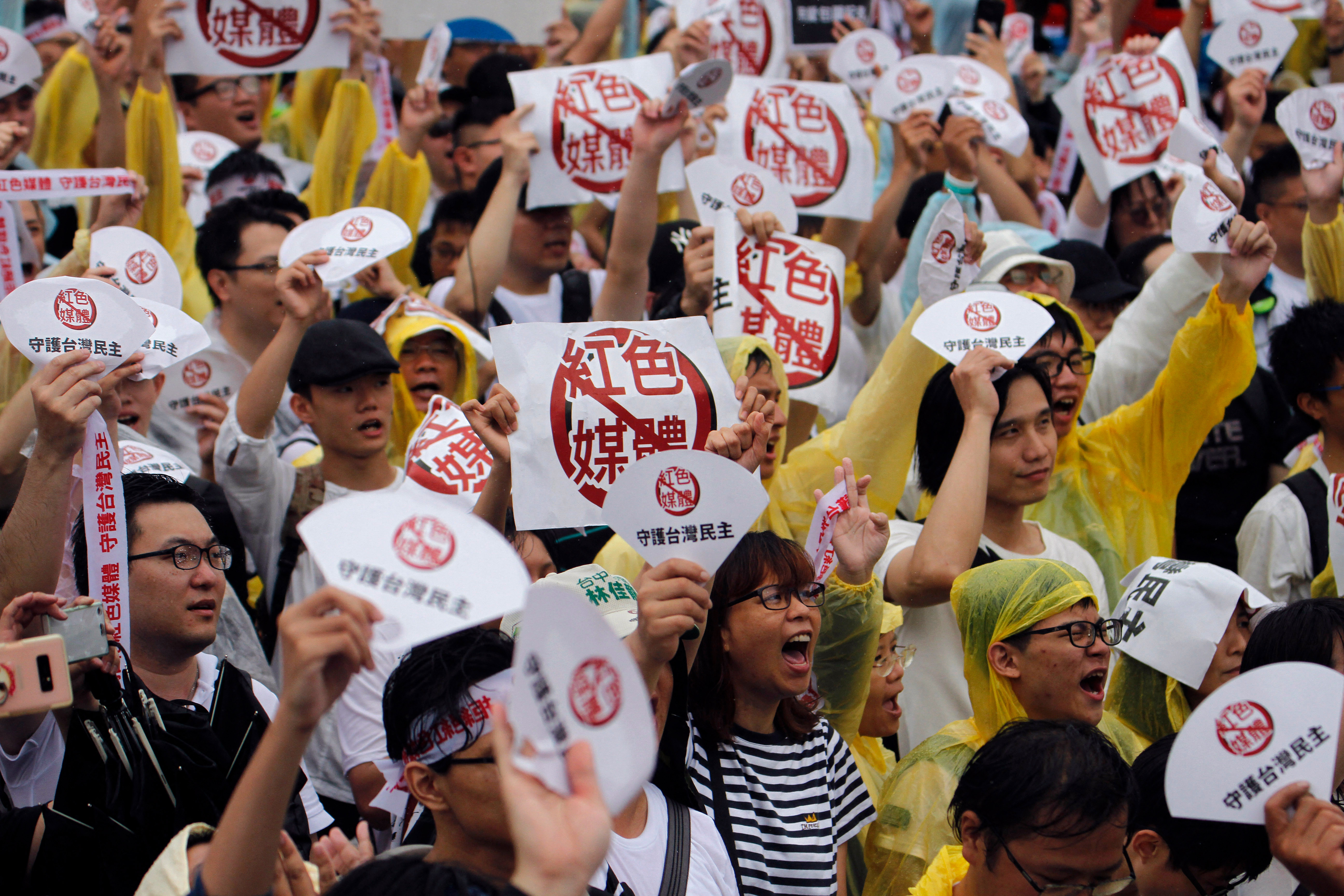 Cover photo: Protest against pro-China media in Taipei in June 2019. HSU TSUN-HSU / AFP
Cover photo: Protest against pro-China media in Taipei in June 2019. HSU TSUN-HSU / AFP
While the Chinese narrative has sought to be supported by organ-harvesting images from other countries, similarly misleading audiovisual footage has been used in Russian disinformation operations. For example, some footage purporting to show Ukrainian "Nazis" or authorities committing atrocities against the Russian minority in Ukraine or Russian soldiers wounded during the invasion actually featured extras paid by the Kremlin. However, there are more direct parallels: the story of Polish organ traffickers hunting Ukrainian refugees was also a favorite message of Russian disinformation in Ukrainian, Polish and European media.
The similarity between the Chinese and Russian hybrid threat was confirmed at a recent panel discussion co-organized by Political Capital, where experts from “front-line countries” Taiwan, Georgia, and Ukraine shared their experiences on the similarities between Russian and Chinese cyber and disinformation attacks. Although the European Union has partially addressed the Russian disinformation threat through the banning of Kremlin-run international media (Sputnik, Russia Today), unofficial subversive activity remains a pervasive threat that Russian troll and bot networks can continue to carry out unhindered. In line with this, the Taiwanese government's four-pillar anti-disinformation strategy (detect, refute, stop, and punish the spread of disinformation) is explicitly challenged by the fact that social media - through local media, influencers, trolls, closed groups - are very effective in spreading disinformation.
The Taiwanese government has made the fight against disinformation a priority since 2018. "Initially, we looked for good examples abroad, but we see that there is no single 'best practice'," said Minister and Spokesperson without Portfolio Ping-cheng Lo, who is responsible for coordinating cooperation between different ministries, including efforts to combat disinformation.
"Disinformation is like a virus. We want to minimize its impact, but we will not be able to eliminate it completely."
- Mr. Lo said. On the government's strategy, he stressed the need to build a "democratic line of defense" based on cooperation between different state institutions (e.g., defense, education) and NGOs (e.g., fact-checking and analysis centers), taking a cross-sectoral and cross-disciplinary approach.
According to him, the government is seeking to:
While the government's anti-disinformation policy is embedded in a media environment that has its own shortcomings (including strong political polarization and sensationalism of the media, economic influence, and manipulability by China), it compares well internationally and particularly in Asia: in the World Press Freedom Index of 180 countries, Taiwan ranked 38th in 2022 (Hungary 85th).
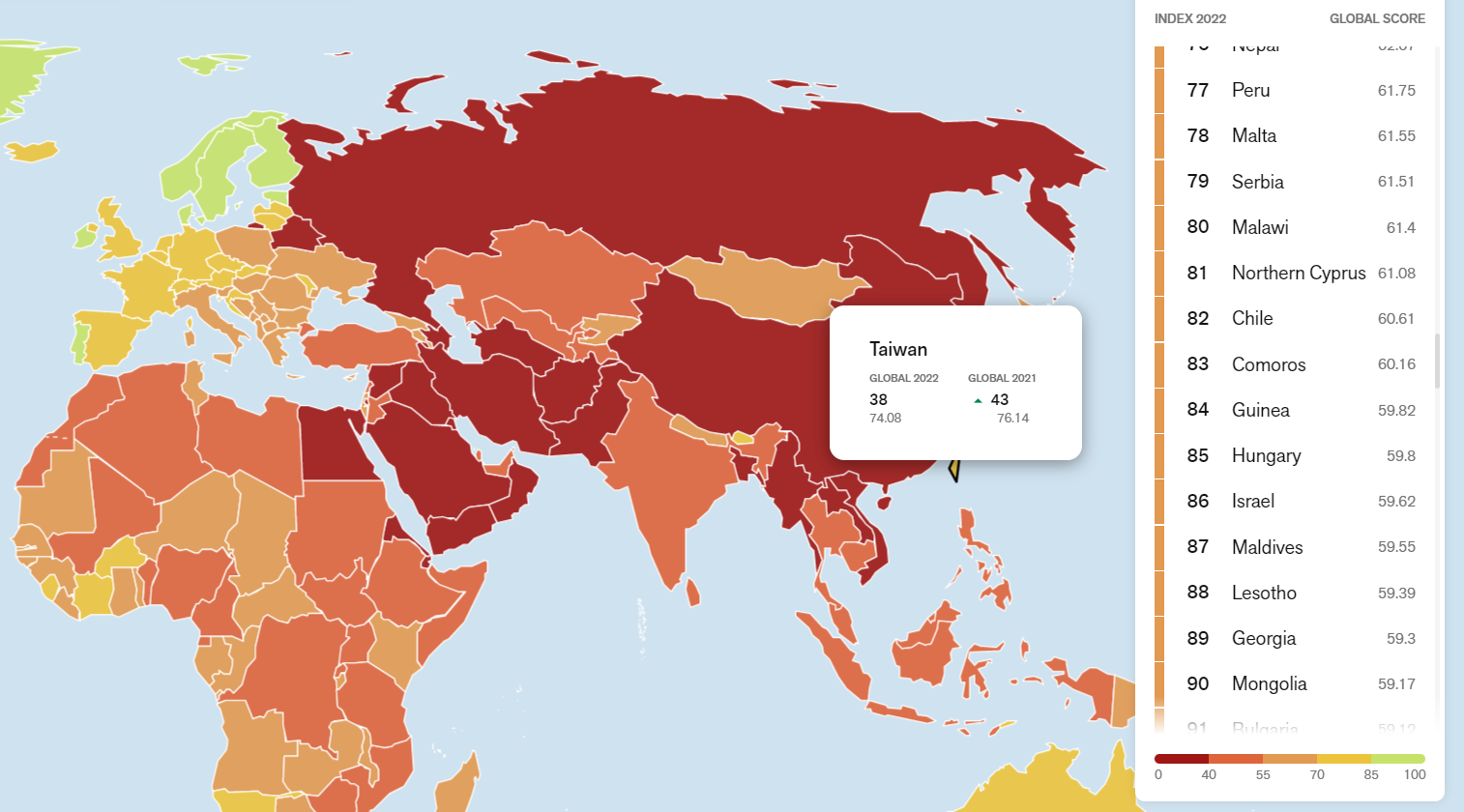
Many NGOs, think tanks, several fact-checking newsrooms, and a community of volunteers and activists deal with different disinformation aspects. These organizations typically distance themselves from the government and do not directly collaborate with it in any direct way, but their work is complementary," said a Doublethink Lab researcher in a report on disinformation efforts in Taiwan.
Taiwan, a country of 24 million, has two fact-checking newsrooms that are members of the International Fact-Checking Network: MyGoPen, launched in 2015, and the Taiwan FactCheck Center (TFC), founded in 2018 - the latter, for example, was the first to alert the international fact-checking community to the dangers of health disinformation about the new virus when it emerged (and subsequently launched the #CoronaVirusFacts Alliance initiative to coordinate fact-checking work on the coronavirus internationally).
While these centers also carry out fact-checking work for Facebook and work with Google, they also focus on messages circulating in private groups on LINE, Taiwan's most popular messaging app. For example, at TFC, a chatbot (illustrated with a detective cat) collects incoming questions from readers. If a fact-check has already been done on the topic, it sends it back to the questioner as an automatic reply.
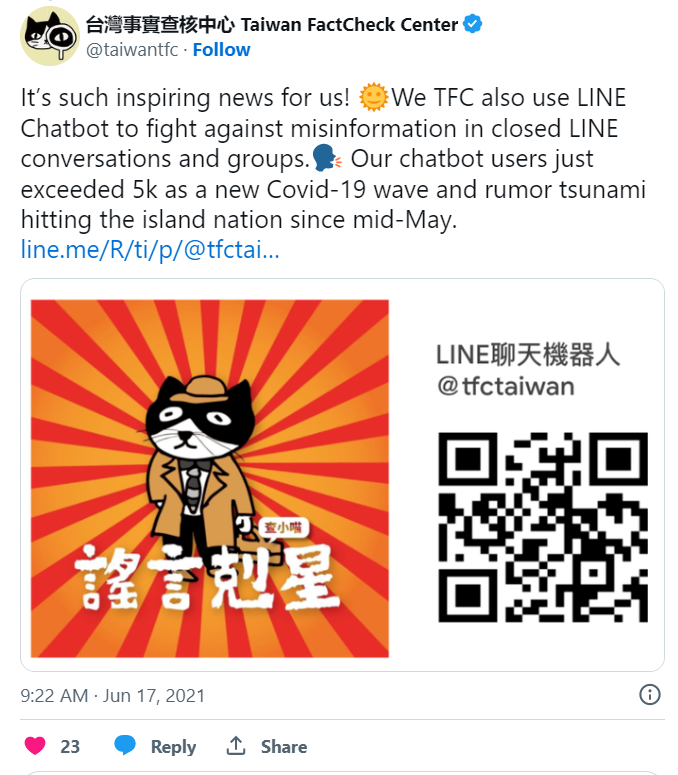
Chatbot from the Taiwan FactCheck Centre
Another innovation from Taiwan is Auntie Meiyu: an AI-based chatbot portraying an aunt with glasses who can be added as a participant to a private group. The bot will then respond to false claims made in the group based on fact-checking articles and other information collected in its database. Although the bot has not been an instant success, partly because of privacy fears, it is already used by more than 300,000 people on a daily basis.
Anti-disinformation efforts are supported by several voluntary groups, one of the best known of which is CoFacts, which is effectively a community fact-check initiative along the lines of Wikipedia and Reddit. Anyone can volunteer for CoFacts and then write posts on the site based on their own knowledge and research about a claim, and the resulting posts are then evaluated by community members. "We don't try to tell people what's true and what's not, the ratings tell us which is the more reliable information," said CoFacts co-founder Billion Lee, who said more than 2,000 volunteers have already posted to the site, with the most active 10-20 of them posting regularly.
The FakeNews Cleaner also relies on volunteers, but they do not work in the online space but in local communities to combat the spread of fake news. In 2018, they began their work by distributing small gifts (such as eco-friendly soaps) to people passing by on the streets and engaging them in conversation - assessing which fake news most affects people's daily lives and what responses they can give. They now work with more than 160 volunteers who deliver training in various regions of Taiwan, including community centers, religious communities, and retirement homes. Their main target audience is the over-60s, a demographic group that is highly susceptible to misinformation - especially on health issues.
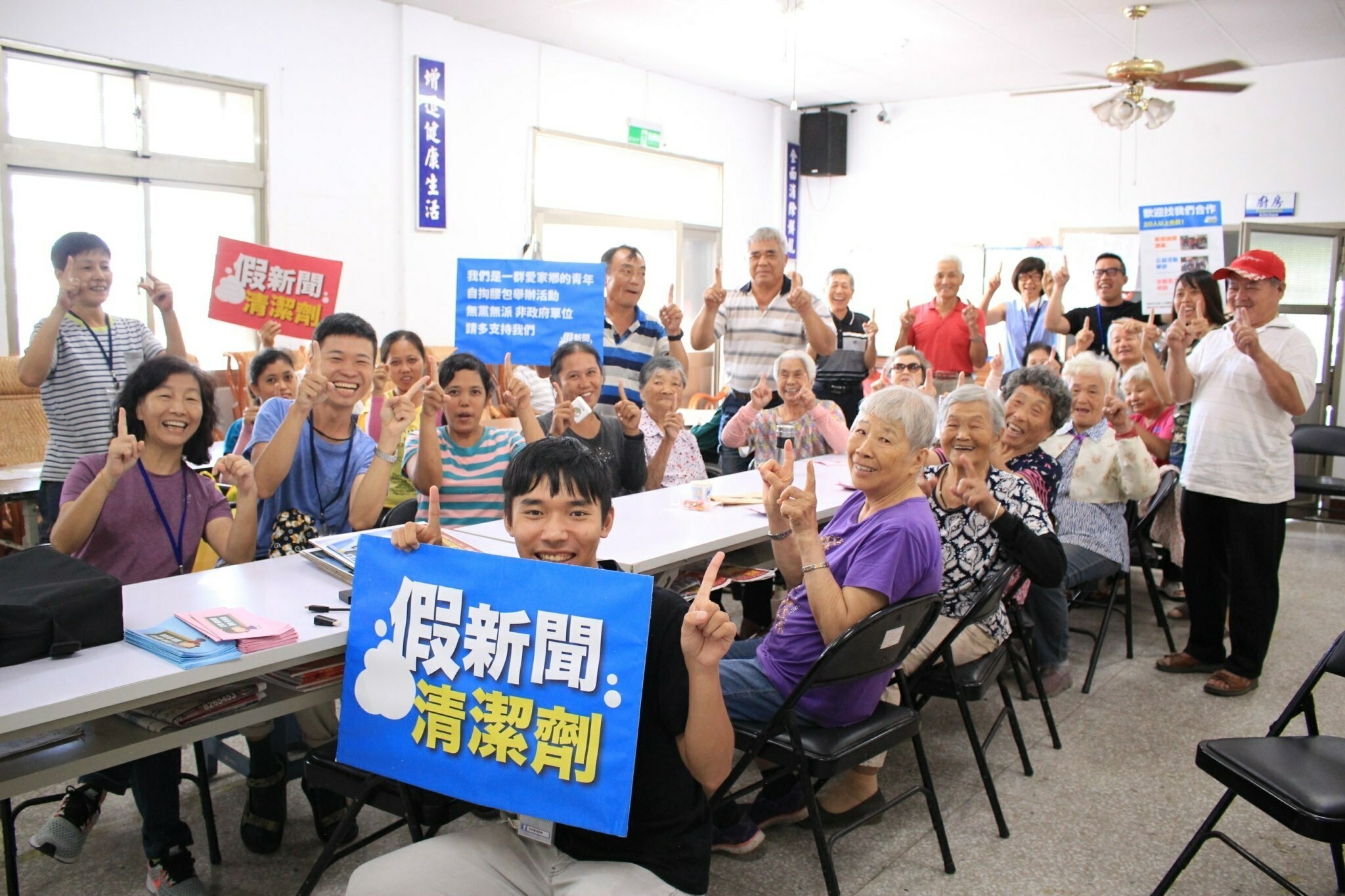 One of the FakeNews Cleaner's community training sessions, August 2019. Source: FakeNews Cleaner Facebook
One of the FakeNews Cleaner's community training sessions, August 2019. Source: FakeNews Cleaner Facebook
They are often taught basic knowledge about using a phone (such as which apps are safe, how to avoid online scams and viruses), but participants are also taught where to check out the information that looks suspicious. Melody Hsieh, the co-founder of FakeNews Cleaner, says it is very useful to be able to offer the work of a variety of organizations in Taiwan:
"Different people can be targeted in different ways, different tools will be appropriate for them. And there is a lot to choose from," she said.
The article summarizes in part the experiences of a study trip to Taiwan in December 2022. The trip was organized by the Representative Office of Taipei in Hungary and the Ministry of Foreign Affairs of the Republic of China (Taiwan) and was attended by a group of 6 Hungarian participants from Political Capital, Lakmusz, and the Association for Sustainable Democracy.